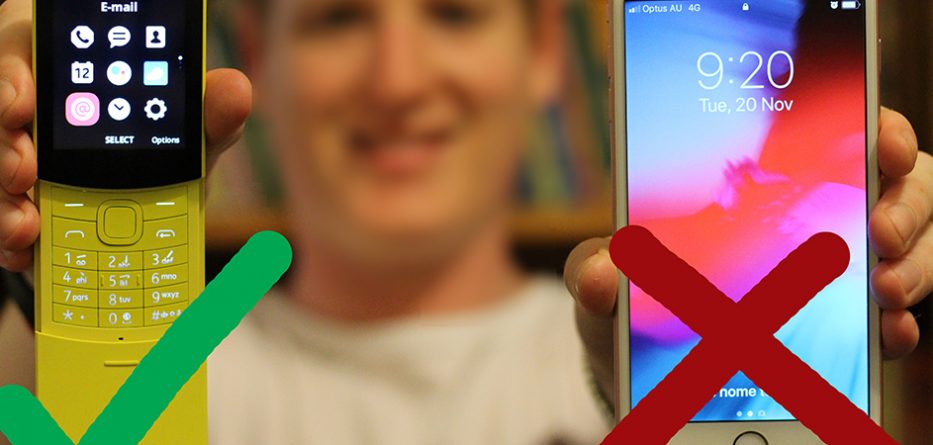This article originally appeared in the February 2019 edition of Broken Bay News.
As someone belonging to the “millennial” generation, I am well acquainted with the increasing impact of technology and social media on the lives of young people.
In fact, these modern advancements in communication and convenience are things upon which I have developed a strong dependence over the course of my formative years. Only in recent times, in the reflective environment of the seminary, have I been able to break away (somewhat) from their powerful allure. This article is not suggesting that the internet or social media are intrinsically evil, or that everyone should completely disconnect. It is merely a reflection on my own experience.
It cannot be denied that mobile technology and social media have brought with them enormous benefits. Not only do they connect us with our friends and colleagues from around the world, but from our hip pocket we have immediate access to breaking news worldwide, an infinite array of technical information, virtually limitless forms of entertainment, online shopping, plus the use of a high-quality camera and a GPS navigation system – just to name a few.
With such a plethora of benefits, why is it that I decided to delete my social media accounts this year and ditch my iPhone for a basic Nokia brick? The answer lies somewhere between my brain chemistry and Christian spirituality.
Let’s begin with the science. Social media is a relatively new phenomenon and so there are not yet any long-term studies on its effects on people. One fact that seems to be emerging though, is that social media and phone usage is becoming increasingly addictive. The reason for this is the neurochemical called ‘dopamine’.
Dopamine is popularly known as the ‘reward molecule’. It is the chemical released in the brain that causes the rush of happiness or contentment when we set or achieve goals. Some examples might include: the feeling which accompanies a refreshing drink after a hard day’s work, or the joy of achieving a new exercise goal. I might even get a small dopamine kick when I finish writing this article. In short, it is the neurochemical that urges us to fulfil our needs or desires.
The same dopamine which impels us towards productive human functions can also be triggered by certain social stimuli – such as receiving a smile or a word of encouragement. We enjoy the feeling caused by these things and instinctively seek them. For this reason, we naturally shape our behaviours to become more sociable and likeable to others. Interestingly, a recent study of Australian consumers conducted by the company Radium One has revealed that social media can create the same effect. “Every time we post, share, like, comment, we are creating an expectation.” Therefore, “we feel a sense of belonging and advance our concept of self through sharing.”
Social media platforms are actually engineered to reward us at irregular intervals (similar to the pokies) to create ‘compulsive loops’ that keep us coming back to check for our next dose of social affirmation. This has become particularly effective nowadays because we have internet access 24/7 and our phone rarely leaves our side. So, what effects might we expect from around the clock access to this social media dopamine goldmine? Here are three reflections from my own experience.
It kills productivity. Most of my friends who have studied at university in recent years can attest to the amazing phenomenon of finding oneself browsing Facebook, YouTube, Twitter, Instagram or Snapchat, even when the essay you haven’t started is due the next day. For me, the habit had become so instinctual, that I sometimes didn’t even realise I was doing it until I felt the looming deadline breathing down my neck. Social media was a constant distraction that drew my attention away from important work. Since deleting it, I’ve started reading more books and seen my academic productivity soar.
It can create a false sense of self. I am a naturally a better writer than I am a speaker. I can also take a selfie that may be a few degrees more flattering than my natural visage. These two factors alone, combined with the internet acting as an intermediary between myself and others, makes my online persona a smarter, better looking, wittier and more exciting version of myself. After years of using Facebook and Instagram, I could feel myself developing a natural sense of what others ‘liked’ most about me. Thanks to my brain’s dopamine reward system, I modified my behaviour and online persona in ways that would most likely appease the masses, as opposed to those most important to me, like God, family and close friends.
It can actually become antisocial. Too many times I have been out for dinner with friends, when someone decides to pull out their phone at the table and begin scrolling through social media feeds. This is certainly a vice which I have been guilty of many times. While these behaviours are often not intentionally rude, I certainly think it denotes a degree of disinterest in the persons present. To combat this temptation among my Third-Year seminary brothers, we have instituted a system whereby phones are now placed face down in the centre of the table and anyone who reaches for it during the meal, must pay the whole bill. It’s harsh, but it works like magic, and it is amazing what great conversations have occurred as a result.
The second and most important point I wish to make in this article was the spiritual effect of the internet and social media. Even a cursory glance at the great Christian spiritual writers will reveal a consistent emphasis on the importance of silence. It is in the silence that we meet God, and converse with Him heart to heart. Noise, on the other hand, is a major obstacle to our prayer. It dissipates the soul and pulls our attention in every direction. As Christians, it is of paramount importance that we find some time every day to enter into the silence with God.
Cardinal Robert Sarah, in his book The Power of Silence, writes:
Today, in a highly technological, busy world, how can we find silence? Noise wearies us, and we get the feeling that silence has become an unreachable oasis. How many people are obliged to work in a chaos that distresses and dehumanises them? Without noise, postmodern man falls in to a dull, insistent uneasiness. He is accustomed to permanent background noise, which sickens yet reassures him. Without noise, man is feverish, lost. Noise gives him security, like a drug on which he has become dependent.
These powerful words are certainly applicable in our use of the internet and social media. It is very easy, in fact quite normal, for someone of my generation or younger to spend almost the entire day subject to incessant noise. Just take a moment to think of all the time you have spent today or yesterday immersed in different forms of noise, whether it be: music, podcasts, videos, images, gaming or just general busyness? Now, alternatively, think of how much time you have spent today in deliberate silence, whether in prayer or meditation? As a seminarian, I sometimes feel embarrassed by the discrepancy between the two. How can we expect to draw closer to Our Lord if our heart is pulled in every other direction? I think of the beautiful words in the Gospel of Matthew:
Therefore, do not be anxious, saying, ‘What shall we eat?’ or ‘What shall we drink?’ or (‘What shall we watch on Netflix’)… For the Gentiles seek all these things; and your heavenly Father knows that you need them all. But seek first his kingdom and his righteousness, and all these things shall be yours as well. ~ Mt 6:31-33
It would be absurd for me to suggest that everyone delete their social media and unplug the internet. After all, most of us use it for work, and others are not as hooked as I was. But I do believe that we should always be in control of technology and never let it control us. We need to put the Kingdom of God first and be prepared to “cut off” anything that stands in the way of our friendship with God – at least until it no longer has a hold on us. (Mt 5:30). Taking a break from social media, although very difficult, has been enormously beneficial for me. Who knows, perhaps Christ is calling you to do the same? After all, He did ask Peter and Andrew to drop the net and follow Him (Mt 4:18-20).
If you have any questions or wish to contact me, please e-mail me at sam.french@bbcatholic.org.au
Sam French is a seminarian of the Catholic Diocese of Broken Bay.
With thanks to Broken Bay News and the Catholic Diocese of Broken Bay, where this article originally appeared.








